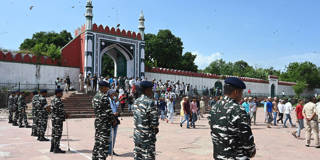Replacing old mosques with new versions of older Hindu temples – as a number of court cases in India currently aim to do – does not right old wrongs; it perpetrates new ones. Unless the Supreme Court puts a firm stop to these disputes, India may find itself facing a resurgence of communal violence.
NEW DELHI – In early January, India’s Supreme Court upheld a lower court’s directive to consolidate 15 lawsuits by Hindu activists seeking the right to investigate the possible existence of sacred Hindu places of worship beneath the Shahi Eidgah, a mosque in Mathura. The Court emphasized that the move benefits all parties, by avoiding multiple proceedings and reducing the risk of conflicting judgments. More fundamentally, however, the Court seems to be attempting to safeguard judicial stability at a time of proliferating religious disputes and prevent the escalation of tensions.

NEW DELHI – In early January, India’s Supreme Court upheld a lower court’s directive to consolidate 15 lawsuits by Hindu activists seeking the right to investigate the possible existence of sacred Hindu places of worship beneath the Shahi Eidgah, a mosque in Mathura. The Court emphasized that the move benefits all parties, by avoiding multiple proceedings and reducing the risk of conflicting judgments. More fundamentally, however, the Court seems to be attempting to safeguard judicial stability at a time of proliferating religious disputes and prevent the escalation of tensions.